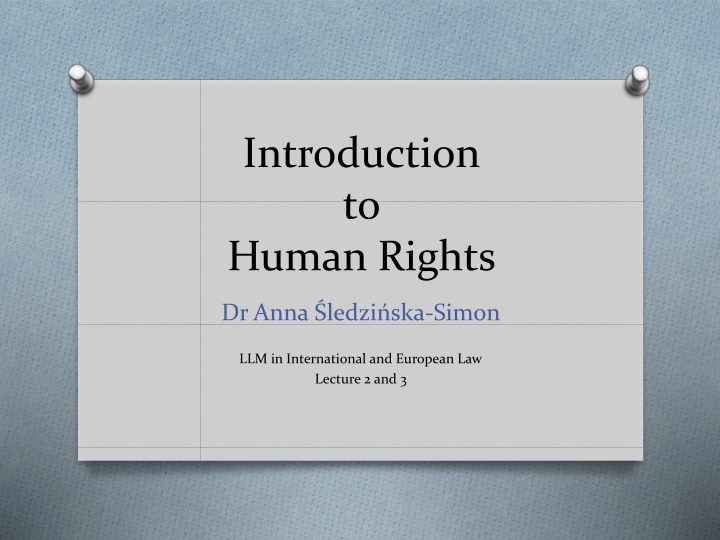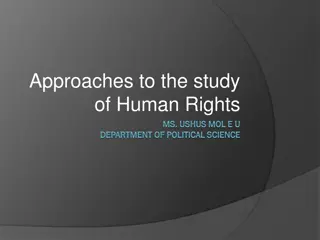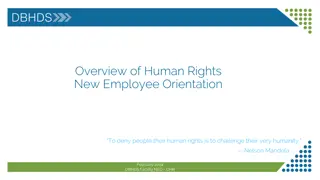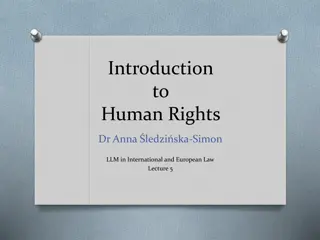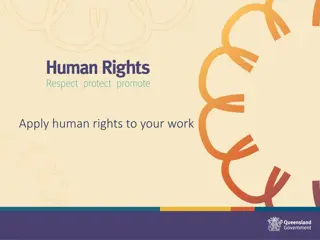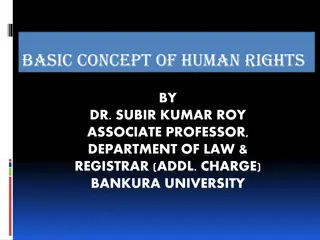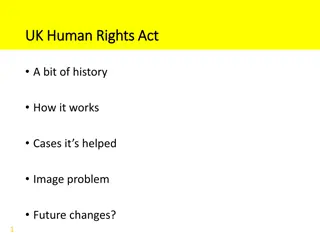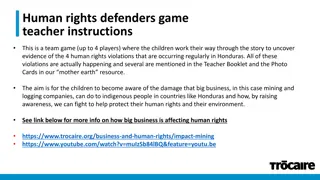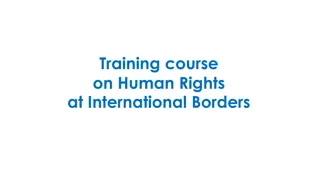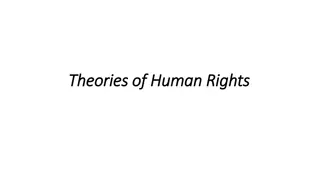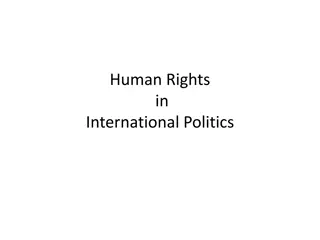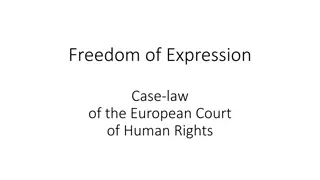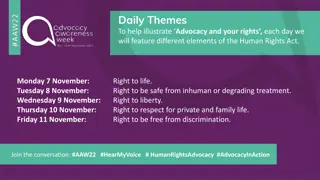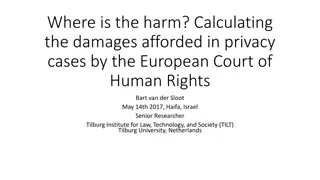Evolution of Human Rights: Concepts, History, and Documents
The evolution of human rights from moral rights to social movements, examining key historical milestones such as Magna Carta, French Revolution, and the Declaration of International Human Rights. Delve into the development of individual and social rights amidst societal changes, conflicts, and humanitarian efforts over the centuries.
Download Presentation

Please find below an Image/Link to download the presentation.
The content on the website is provided AS IS for your information and personal use only. It may not be sold, licensed, or shared on other websites without obtaining consent from the author.If you encounter any issues during the download, it is possible that the publisher has removed the file from their server.
You are allowed to download the files provided on this website for personal or commercial use, subject to the condition that they are used lawfully. All files are the property of their respective owners.
The content on the website is provided AS IS for your information and personal use only. It may not be sold, licensed, or shared on other websites without obtaining consent from the author.
E N D
Presentation Transcript
Introduction to Human Rights Dr Anna ledzi ska-Simon LLM in International and European Law Lecture 2 and 3
Concepts and short history O Human rights as moral rights O The concept of limited government O 18th century individual rights O 19th century social rights and movements O 20th century human rights
Historical evolution O Feudalism rights, privileges, and immunities social hierarchy and divisions inequality is the social norm - - - O Absolutist monarchy in Europe monarchs as guarantors of social protection and welfare - O 18th century developing the concept of individual rights Locke the theory of social contract , yet, the concept of rights is not based on a notion of universal human rights - -
Historical evolution Basic documents towards two traditions of rights in Europe and the US O Great Britain - Magna Charta Libertatum (1215) - Bill of Rights (1689) O French Revolution - Declaration of Rights of a Man and Citizen (1789) O US - Bill of Rights (1791)
Historical evolution O 19th century - industralization - colonialism - slavery - social problems and needs O International humanitarian law O International Red Cross (1863) O Geneva Conventions (1864, 1906, 1929, 1949) O IWW and minority protection problems O O O 1919 ILO 1920 League of Nations (until 1946) 1930s New Deal
Historical evolution O 1929 Declaration of International Human Rights (ILI, NY) O 1933 Hitler s rise to power O 1933 Enabling Act O 1935 Nurenberg Laws O Franz Bernheim case before the League of Nations (1933) challenging the protectionguaranteed under the bilateral Minority Clauses O Projects for international laws on universal protectionof rights (minority rights) O Withdrawal from the League of Nations O Extermination of Jews O 1933 Rafa Lemkin s suggestions for prohibition of barbarianism (later the 1948 Convention against genocide)
Historical evolution O O Atlantic Charter Roseveltand Churchill (1941) 1941 F.D. Roosevelt Freedom of speech Freedom of worship Freedom from want Freedom from fear O O O O O Declaration of United Nations (1942) - towards universal human rights and justice Decolonization right to self-determination and group rights come first, then developed towards authoritarianism New democracies and non-democratic regimes declared support for human rights fordifferentreasons O O
Historical evolution O UN Charter (1945) universal security not rights, but human rights are meantioned in the Preamble O Human Right Commission (1946) O Universal Declaration of Human Rights (1948) all big powers had acted against thevery ideaof human rights - O Russia gulag O GB and France colonies O US racial segregation The adoption of UDHR signed the concession of the big powers, but the USRR abstained for the insufficient reference to socio- economic rights, so did South Africaand Saudi Arabia
Historical evolution O After 2WW no separate protection of minorities political reasons for allowing intervention in domestic matters O O Yet Article 27 ICCPR In 1948 - no mechanism of individual complaints to the UN Commission on Human Rights In 1976 individual complaint mechanism included in the First Optional Protocol to the International Covenants on Civil and Political Rights (communication to the UN Human Rights Commitee) In 2008 the First Optinal Protocol to the International Covenant on Economic, Social and Cultural Rights O O O A concept of indivisibility of all human rights O From individual rights to universal human rights O Human dignity as a source of all human rights; yet, dignity is subject to conflicting interpretations
Historical evolution O 1950 ECHR granting individuals the status of subjects of international law O 1966 Covenants split due to the prevailing views on differnt enforcement mechanisms applicable to civil and political rights and social, economic and cultural rights O Procedural mechanisms of control establisment of international bodies (courts or quasi-courts) in charge of monitoring of the implementation of international human rights treaty law. Monitoring includes periodic reporting, complaints (interstate, as well as individual and collective) mechanism and inquiry procedures O The concept of justiciability and the proccess of juridicization of rights
Human rights in the 20th century O Restoration of rights the increasing importance of human rights in internaitonal politics in the end of the Cold War, 1975 the Helsinki Agreement, new human rights movements in the world (Soviet block, Chile, India, South Africa). Rights and obligations human rights are primarily based on a vertical relationship between individuals and the state, whereby individuals are rights-holders (subjects of rights) and the state is the duty-bearer (holds the duty to protect, respect and fulfill); recently, more human rights also apply in horizontal relationships (between private parties ie. protection of privacy, data protection, prohibition of discrimination), cultural / religious interpretations of human rights focus on the relationship between individual rights and duties towards the community or give prorioty to the collective interests, socialist concept of duties made the enjoyment of rights and fredoms dependent on the realization of duties towards the society. O
Human rights in the end of the 20th century O The interventions humanitarianism (keyword: protection of those in need). duty to protect and humanitarian concept the of O New globalization perpetrators and subjects of human rights), global use of resources, cultural wars. challenges War on Terror, (private companies as
Human rights in the 21th century O You arewriting this chapter... O New challenges - global pandemics and the use of emergency measures, migration and refugee crises, information wars, new populisms and authoritarianisms, climate exclusion, universal access to health insurance and health care... change, social O Good health and good luck
